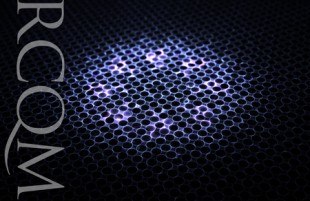Oct 1 2014
Rice University today launched the Rice Center for Quantum Materials (RCQM), a multidisciplinary effort to solidify Rice’s leadership in the exploration of high-temperature superconductors and other exotic materials both by attracting top faculty and students and by inviting the world’s leading experts to Rice to collaborate on research.
 The Rice Center for Quantum Materials is a multidisciplinary effort to solidify Rice University's leadership in the exploration of high-temperature superconductors and other exotic materials.
The Rice Center for Quantum Materials is a multidisciplinary effort to solidify Rice University's leadership in the exploration of high-temperature superconductors and other exotic materials.
“Materials research is a major strength at Rice University,” said Provost George McLendon. “The Rice Center for Quantum Materials will propel us to pre-eminence in this key area of research at the intersection of materials science, physics and chemistry.”
Quantum materials are substances that take on exotic physical properties due to strong interactions of billions upon billions of subatomic particles. High-temperature superconductivity, the best-known of these properties, occurs when electrons form pairs and flow without resistance. But quantum materials also can exhibit other, equally strange properties: electrons that appear to be thousands of times more massive than they should; electrons that split apart and behave as several independent “quasiparticles;” and colossal magnetic responses that could be the foundation of a new form of information technology.
Center director Qimiao Si, Rice’s Harry C. and Olga K. Wiess Professor of Physics and Astronomy, said Rice is making a substantial investment to bring many of the world’s leading experts in quantum materials to campus. The center will foster fundamental research at Rice and it will incubate new collaborations by organizing conferences and workshops, hosting distinguished visitors, attracting top faculty and postdoctoral fellows and developing international and domestic partnerships.
“The center will address some of today’s most intriguing and important areas of physics by leveraging more than 20 Rice research groups that are already studying quantum materials, both from an experimental and theoretical perspective,” Si said.
Registration opened today for the center’s inaugural conference December 15-16. Si said the meeting is expected to draw about 80 participants, including distinguished quantum materials researchers from the U.S. and abroad. He said the scientific program will include both technical sessions and a panel discussion about the current state of quantum materials research worldwide.
“Some of the phenomena in this field have stymied physicists for decades, but enormous progress — both experimental and theoretical — has been made in recent years,” Si said. “There is a growing expectation that major breakthroughs are on the horizon, and that is driving competition for top talent. Institutions across Asia, Europe and North America are investing heavily in quantum materials expertise.
“Rice is well-positioned to lead in this area,” Si said. “First, the university has an intimacy that makes cross-disciplinary research the norm rather than the exception. Collaboration comes naturally here. We are small enough that almost everyone on campus can be on a first-name basis, and we have always used that to our advantage.
“But in the area of quantum materials, we also have numbers,” Si said. “We woke up one day and said, ‘Wow. We’re big.’ That’s unusual for Rice, and it presents us with an opportunity to capitalize on our broad expertise in this field and on our unique collaborative culture.”
Rice already has leading research programs in areas like materials synthesis, quantum criticality, ultracold atomic physics, non-equilibrium dynamics, nanoscale physics and functional materials for energy applications. Si said RCQM sprang from a grassroots effort by Rice faculty in these areas to work more closely to build international collaborations that could spur breakthroughs.
“Rice’s leadership realized that we have the right combination of interdisciplinary partnerships and in-depth expertise to really make a difference,” said Yousif Shamoo, vice provost for research. “This is an incredibly exciting time to be a quantum materials researcher, and RCQM positions Rice to do great things over the next few years.”
RCQM is jointly supported by Rice’s offices of the Provost and Vice Provost for Research, the Wiess School of Natural Sciences, the Brown School of Engineering, the Smalley Institute for Nanoscale Science and Technology and the departments of Physics and Astronomy, Electrical and Computer Engineering, and Materials Science and NanoEngineering.
Source: http://www.rice.edu/